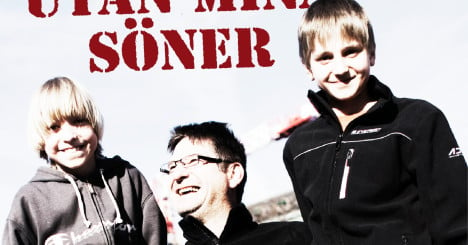It’s many divorced parents’ nightmare: the kids go on a visit to the other parent, only to disappear off the face of the earth.
Some 95 Swedish children are currently believed to be kidnapped, in most cases by a parent or close family member. Many of the children are the product of a marriage between a Swede and a foreigner. Of all kidnapped Swedish children, 33 are thought to be held in Sweden and 62 abroad. In 60 percent of cases, the kidnapper is the mother.
In many cases, getting help from the police is an uphill struggle.
Australian George Pesor knows this only too well. His Swedish ex-wife failed to return their two sons back to Australia after they had been on a visit to Sweden. This despite the fact that Pesor had sole custody and his ex-wife only visiting rights.
Ingrid Carlqvist, a Swedish journalist who has written a book about Pesor’s case, says Swedish society is unfairly biased against fathers:
“Many mothers have come to believe that they are best for the children, even when a court has given full custody to the father. The mothers get support from the kvinnojourer [Sweden’s network of battered women shelters], the feminist movement, friends and families. Even the media write stories sympathetic to the mother, despite the fact that she’s the criminal.”
Pesor found this to his cost. Few media outlets initially took up his case, and it was only through blogging together with Carlqvist that he could generate some interest. Yet six months after his sons disappeared, the police investigation had turned up few leads. Pesor was forced to get on a plane to Sweden and take control of the situation. Amazingly, he had tracked down his children within a week.
Pesor’s troubles began last September when a court in Melbourne ordered that his sons Oliver, 11 and Nicholas, 10, must visit their mother in Sweden. The visit was ordered to go ahead despite the fact that the mother had told the boys on the phone that she would not let them go back to Australia again. She had also made numerous unsubstantiated child abuse allegations against Pesor’s brother-in-law.
Pesor let the boys go to Sweden, despite fearing that they wouldn’t come back. When he contacted airline KLM on October 9th to make sure they had boarded, his worst fears were confirmed – the airline computers had registered his sons as no-shows. He immediately sought a court order in Australia to get Oliver and Nicholas back. The order was granted and Swedish authorities agreed to implement it, in accordance with the Hague Convention, the international agreement covering international custody disputes.
The problem was that nobody knew where the children were.
“I was in continuous contact with the police in Australia and Sweden, as well as in Finland, Belgium and Germany – after all, we didn’t even know if they were still in the country,” he told The Local.
“It was a bureaucratic and slow process. On a personal level, police officers took this seriously, but after a couple of months I realised it was not a high priority and they were really just paying lip service.”
“Eventually I realised that this is not like it is on TV.”
Frustratingly, the police failed to follow up apparently vital clues. Pesor started a blog together with Ingrid Carlqvist, who had taken an interest in the case. They developed strong suspicions that one of the people making comments on the blog was the mother and one of the other commenters actually identified herself as the mother’s sister.
“The police refused to trace their IP addresses. They said it could have been anybody, and told me the 2,000 kronor cost of carrying out the searches was more than they could afford.”
This was the final straw – Pesor decided to take matters into his own hands: “I came to Sweden, slept in the car and started surveillance.”
Pesor met with police chiefs and told them he thought the boys’ grandparents’ house should be put under observation. If they couldn’t do it, he’d do it himself, he said. He parked close to the house and watched.
“It was odd – the blinds were closed the whole time. I bought a listening device so that I could hear what was going on inside. The very first window I listened at I could hear the boys and their mother. The adrenalin was going at 100 miles an hour.”
Pesor called the lead detective on the case, and within a couple of hours Pesor’s sons were being led out of the house by police officers. Pesor, who was parked down the street, stood on the roof of his car to get a better view of events:
“When I saw Oliver leave the house I just jumped off the car.” They were reunited a few hours later at a police station in Eskilstuna, where the boys were interviewed by police and social workers. Later that night, father and sons were told they were free to go back to Australia.
Carlqvist says she hopes her book about the case will change attitudes:
“Things are rarely black and white – there are horrible fathers, but also awful mothers. Whoever we are we have to follow the law and the courts’ decisions.”
The boys’ mother was convicted in July of arbitrary conduct with a child (Swe: ‘egenmäktighet med barn’) and sentenced to ten months in jail. She was also told to pay 140,000 kronor ($17,700) in compensation to the boys and their father.
Pesor is now happily reunited with his sons, but with an increasing number of international marriages, cases like his seem set to become more frequent.
Carlqvist’s book about Pesor, ‘Inte Utan Mina Söner,’ (‘Not Without my Sons’) is published by Blue Publishing.
Some names in this article have been changed.



 Please whitelist us to continue reading.
Please whitelist us to continue reading.
Member comments